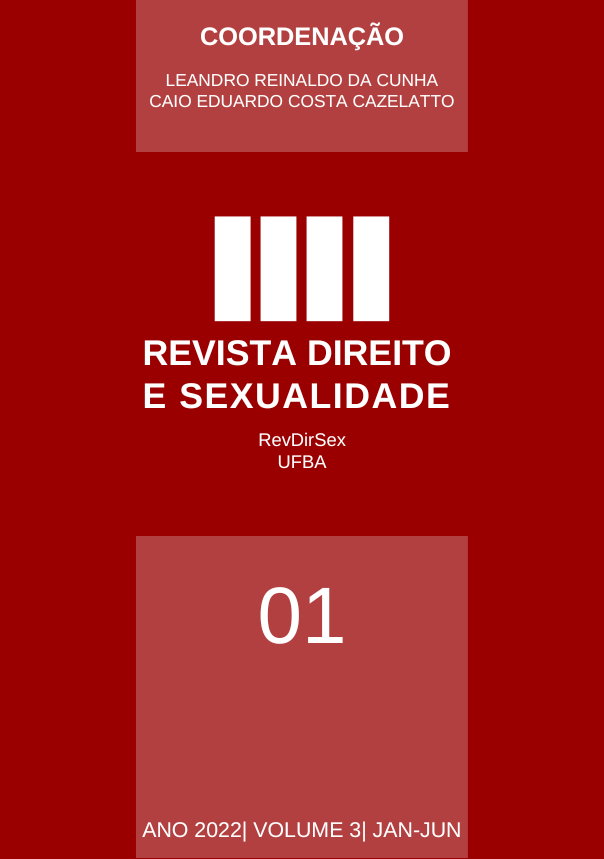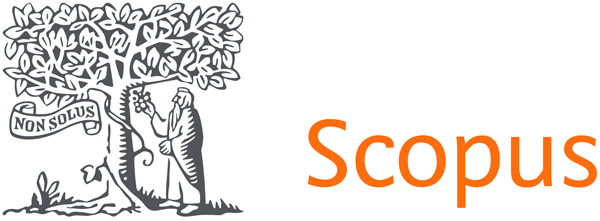A FAMÍLIA E A SEXUALIDADE NO DIREITO
UMA PROPOSTA DE FORTALECIMENTO DA DEMOCRACIA BRASILEIRA POR MEIO DO LETRAMENTO VERNACULAR
DOI:
https://doi.org/10.9771/revdirsex.v3i1.47456Keywords:
Direitos Humanos, Direito de Família, Direito Constitucional, Direito Civil, Direito EducacionalAbstract
Abstract: The general objective of this work is to analyze how Brazilian legislation has provided treatment to different types of family, relating it to the protection of human dignity, a basic principle of the Constitution of the Federative Republic of Brazil (CRFB/88), proposing the way forward. education as the driver of vernacular literacy and, consequently, of the strengthening of Brazilian democracy. Therefore, the first specific objective is to present the chronicle “Catch the companion paddle”, by Café (2019), with a focus on the Child and Adolescent Statute (ECA), proposing that the student recognizes himself as a subject of rights and duties, via the realization of vernacular literacy, a driver of citizen awareness. The second, in turn, presents the types of family, considering the social plurality of Brazil, as well as relating them to the way in which law and reality are manifested in Brazilian territory. Finally, the third specific objective analyzes the legislative inertia of the National Congress, highlighting how the concept of family has taken more account of the patrimonial right than that of the human person. In the bibliographical research, with qualitative data collection, it is verified how prejudice against homo-affective people and all those who experience new forms of family, contrary to the “traditional” conception, has been maintained in Brazil, under the envelope of a Democratic State of Right.
Keywords: Human Rights; Family Right. Constitutional Right. Civil Right. Educational Law.
Downloads
References
REFERÊNCIAS
AMARAL, S. M. M. União Homossexual como Direito de Família. Migalhas, 01 de outubro de 2008. Disponível em <http://www.migalhas.com.br/dePeso/16,MI70205,41046-Uniao+homossexual+como+Direito+de+Familia>. Acesso em: 03 ago. 2021.
BAHIA, F. Constitucional Prática. 14. ed. Salvador: JusPODIVM, 2020.
BAKHTIN, M. Questões de Literatura e de Estética: a teoria do romance. Tradução: Aurora Fornoni Bernadini et al. 7.ed. São Paulo: Hucitec, 2014.
BAKHTIN, M. Estética da criação verbal. Tradução: Paulo Bezerra. 6. ed. São Paulo: Martins Fontes, 2011.
BRASIL. [Constituição (1988)] Constituição da República Federativa do Brasil: promulgada em 5 de outubro de 1988. In: SARAIVA. Vade Mecum Saraiva. 18. ed. São Paulo: Saraiva, 2021, p. 1-137.
BRASIL. Lei n.º 8069. Dispõe sobre o Estatuto da Criança e do Adolescente e dá outras providências. Brasília, 13 de julho de 1990. Disponível em: http://www.planalto.gov.br/ccivil_03/leis/l8069.htm. Acesso em: 3 ago. 2021.
BRASIL. Supremo Tribunal Federal. ADI n.º 4277 – DF. Relator Min. Ayres Britto. Voto do Min. Marco Aurélio. Julgado 5 de maio de 2011. Disponível em: https://www.stf.jus.br/arquivo/cms/noticiaNoticiaStf/anexo/ADI4277MA.pdf. Acesso em: 3 ago. 2021.
CAFÉ, T. Notas Afetivas: entre memórias, poesias e leituras crônicas. 2. ed. Salvador: Egba, 2019.
CARVALHO, A. K. União poliafetiva e a sua possível legalidade no Brasil. Revista Consultor Jurídico. [s.l.]: Conjur, 1 de julho de 2020. Disponível em: https://ambitojuridico.com.br/cadernos/direito-de-familia/uniao-poliafetiva-e-sua-possivel-legalidade-no-brasil/. Acesso em: 3 ago. 2021.
CHIZZOTTI, A. A pesquisa qualitativa em ciências humanas e sociais: evolução e desafios. Revista Portuguesa de Educação, 2003, 16(2), p. 221-236, 2003, Universidade do Minho.
DIAS, M. B. Manual de direito das famílias I Maria Berenice Dias. -- 10. ecl. rev., atual. e ampl. -- São Paulo: Editora Revista dos Tribunais, 2015.
ESCRITA reconhece união afetiva a três. Santo Agostinho: IBDFAM, 21 de agosto de 2012. Disponível em: https://ibdfam.org.br/noticias/4862/novosite. Acesso em: 3 ago. 2021.
FREIRE, P. Ação cultural para a liberdade. 17. ed. Rio de Janeiro: Paz e Terra, 2019.
GIL, A. C. Como elaborar projeto de pesquisa? 4 ed. São Paulo: Atlas, 2002.
SILVA, A. B. Formas de família no Brasil e seus aspectos legais e culturais. [s. l.]: Brasil Escola, c2021. Disponível em: https://monografias.brasilescola.uol.com.br/direito/formas-familia-no-brasil-seus-aspectos-legais-culturais.htm#sdfootnote1sym. Acesso em: 03 ago. 2021.
SIMÃO, J. F. Sim, eu tinha razão e o STF confirmou que não há famílias paralelas no Brasil. Revista Consultor Jurídico. [s.l.]: Conjur, 20 de dezembro de 2020. Disponível em: https://www.conjur.com.br/2020-dez-20/processo-familiar-stf-confirma-nao-familias-paralelas-brasil. Acesso em: 3 ago. 2021.
Downloads
Published
How to Cite
Issue
Section
License
Copyright (c) 2022 ambos

This work is licensed under a Creative Commons Attribution-NonCommercial-NoDerivatives 4.0 International License.
- This Journal reserves the right to direct normative, spelling and grammatical alterations in original works, with the intention of maintaining the standard worship of the language, respecting the authors' style.
- The exclusive opinions by the authors are their sole responsibility.
- The licensing rights used by the journal are the Creative Commons Attribution 4.0 International License.
- Copyright belongs exclusively to the authors. Sharing (copying and distributing the material in any medium or format) and adaptation (remixing, transforming and re-adapting the original work for all purposes, including commercial) are permitted, provided that due credit is given for the initial publication in this journal.
- Authors are permitted and encouraged to publish and distribute their work online after publication, as this can increase the impact and citation of the published work (See The Effect of Open Access).













